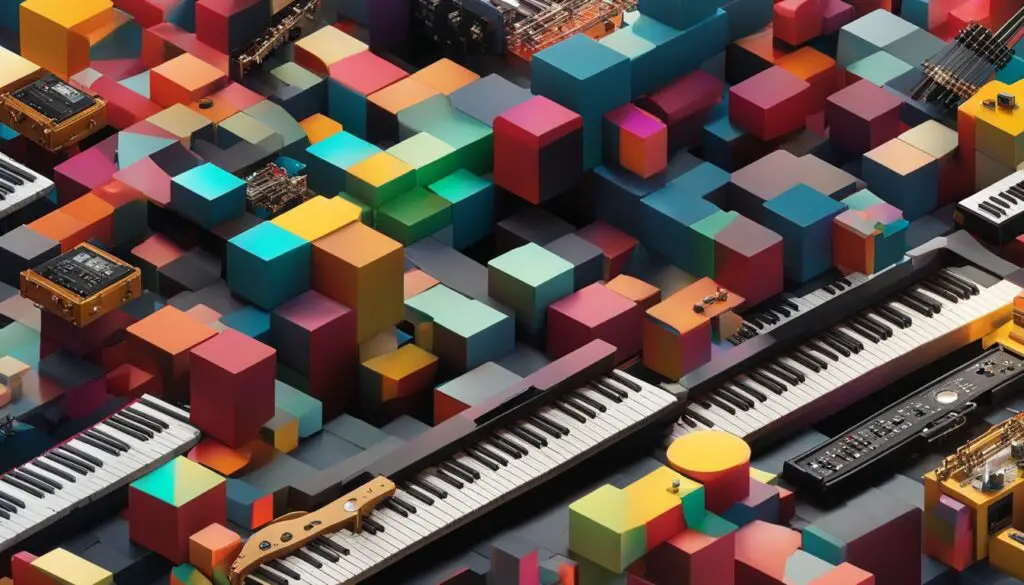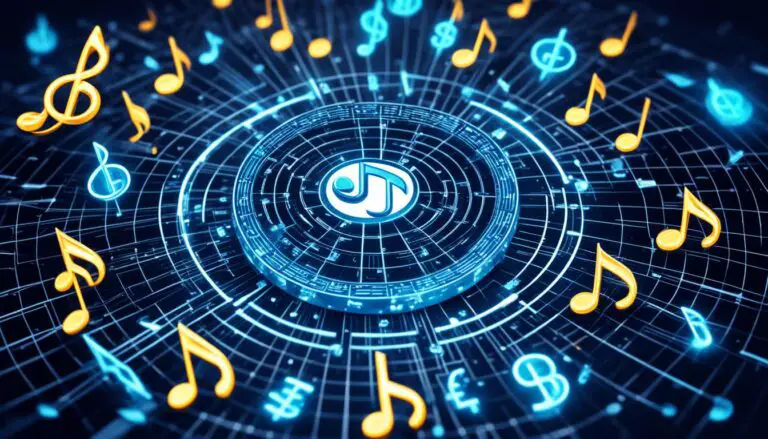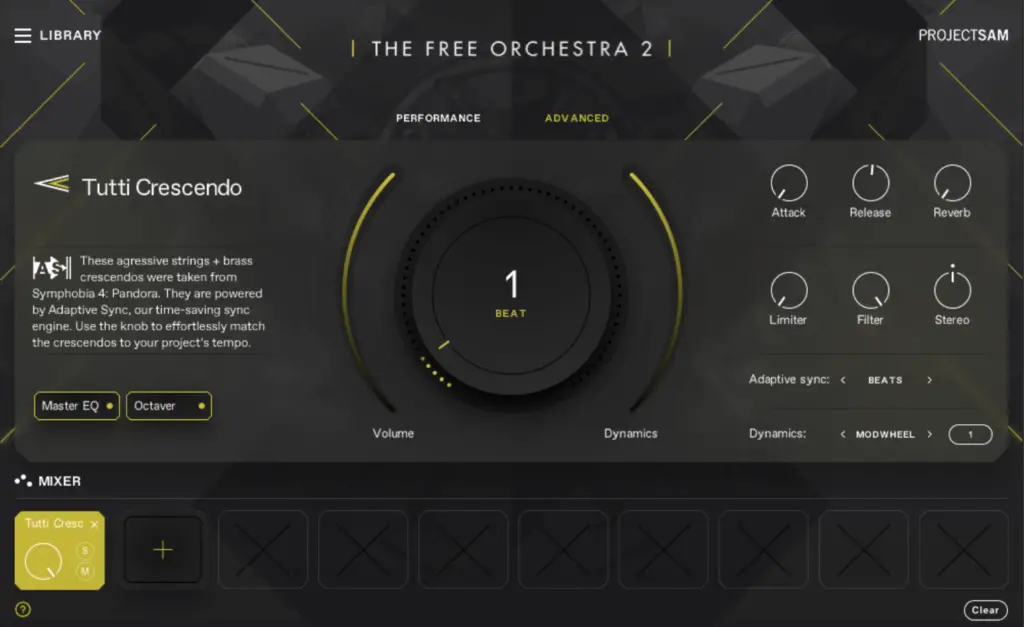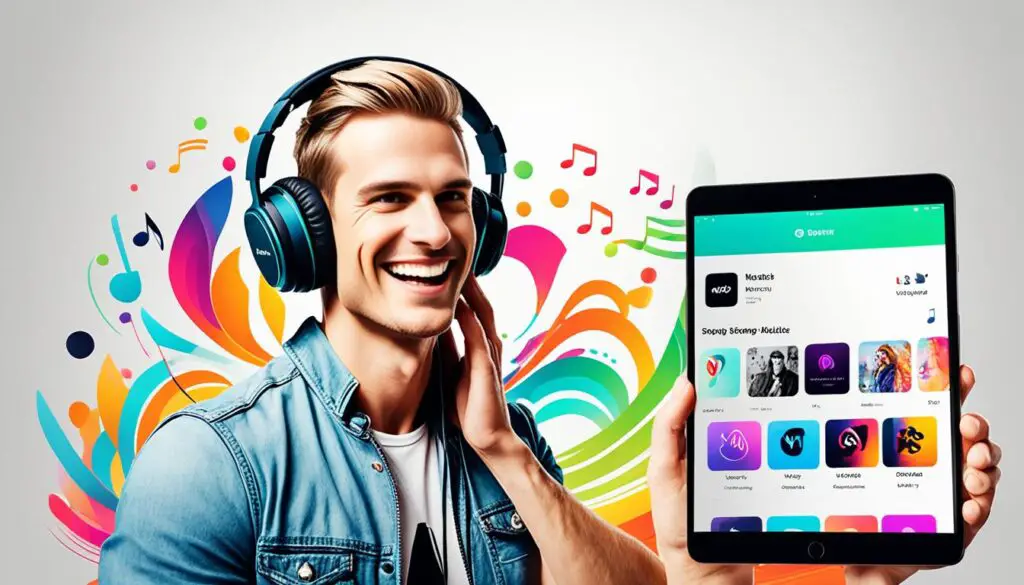Picture a world where musicians sell their songs straight to fans. In this world, there are no big agencies taking their share. Only the fans and the creators. This is now possible thanks to NFTs in music. They are transforming how artists share their work and earn money.
What are NFTs? They’re special digital items that use blockchain to prove they’re real and unique. Things like songs, artwork, and band T-shirts can be turned into NFTs. This way, artists get direct support from their fans. It’s a big change from the old days of music, where middlemen took a lot of the money.
Key Takeaways
- NFTs have revolutionised the music industry by giving artists direct access to fans and new ways to monetise their work.
- Musicians can sell unique digital assets, such as limited edition music releases or virtual concert experiences, directly to their fanbase through NFT marketplaces.
- NFTs enable a more transparent and equitable system for music royalty distribution, allowing artists to retain a larger share of the revenue generated by their work.
- The direct connection between artists and fans fostered by NFTs enhances engagement, loyalty, and opportunities for unique experiences and collaborations.
- While promising, the NFT landscape in music also faces challenges, such as environmental concerns and the need for robust regulatory frameworks to address issues like scams and copyright infringements.
Understanding NFTs: A Paradigm Shift
It’s key to know what music NFTs are to see their role in the industry. NFTs stand for non-fungible tokens, unique digital items. They use blockchain technology to prove who owns them and that they’re real. This is different from cryptocurrencies like Bitcoin, which can be swapped one for the other.
Uniqueness and Authenticity of Digital Assets
Each music NFT is only one and shows a certain piece of content, like a song or album. The blockchain makes sure it’s real and owned by someone. This makes the asset real and hard to find elsewhere.
Blockchain Technology: Enabling Ownership and Scarcity
With blockchain, you can’t copy or swap music NFTs easily. The way blockchain works makes these digital items special and real. This special quality makes them valuable. It helps artists find new ways to earn from their creations.
The Rise of NFTs in the Music Industry
Music NFTs are changing how artists make money. They allow artists to earn directly from their fans without middlemen. This means musicians can sell exclusive music content, limited editions, and unique virtual music experiences to their biggest supporters.
Through NFT marketplaces, musicians can now connect with their fans more deeply. This direct selling approach adds a new way for them to earn money. It also makes fans feel closer to their favourite artists.
Direct-to-Fan Monetisation Model
NFTs change music’s money game by cutting out the fees usually charged by record labels and streaming services. They give artists more say on the sale of their music. Artists can decide on the pricing and how many copies they want to sell.
This move lets artists make more money. They can offer rare, digital items and adjust prices to reflect their fans’ interest. This creates a new model where both artists and fans win.
Exclusive Content and Experiences for Fans
NFTs do more than sell music; they change how fans enjoy it. Fans can get unique stuff like special music, chances to meet artists virtually, or even work with them. These one-of-a-kind experiences make fans feel special and closer to their idols.
Creating this exclusivity helps drive up the value of these digital items. As a result, it makes the relationship between artists and their fans stronger.
Revolutionising Music Rights and Royalties
Music NFTs are changing how artists make money. They let artists keep more of their money and control their music. Now, artists don’t need to depend only on record labels or streaming services.
Instead, they can use music NFTs to own their music rights. This gives them a new way to earn money from their songs.
Decentralised Royalty Distribution
With NFTs, artists can do more than just sell their music. They can share the money their music makes in new ways. For example, they can sell parts of their songs to fans.
Thanks to the blockchain, artists can see clearly where their money comes from. This means they get paid fairly whenever their music is bought or sold.
Fractionalising Music Catalogues
Startups like Catalog are making songs more shareable with NFTs. They let fans own a part of a song. This changes how the music business works. Fans can invest in artists early and share in their success.
For artists, this means their supporters can make money from their songs. It’s a new way for artists and fans to support each other.

| Metric | Traditional Music Industry | Music NFTs |
|---|---|---|
| Artist Earnings per Stream | $0.004 | $40 per mint |
| Earnings from 1 Million Streams | $4,000 | $4,000 (100 people buying a $40 NFT) |
| Ownership Model | Dominated by companies | Shift to individuals and fans |
| Fan Engagement | Limited | Deeper connection and investment |
Fostering Fan Engagement and Loyalty
NFTs change how fans enjoy music. Purchasing an NFT offers exclusive content. You can get virtual meet-and-greets, backstage passes, or the chance to work with your favourite artists.
These unique perks make fans feel special. It makes them closer to the artists they love. This connection boosts the NFTs’ value, making the fan-artist bond stronger.
Patronage and Co-creation Opportunities
Musicians use NFTs to thank their loyal fans. They offer perks like seeing new songs first or VIP concert tickets. This makes fans feel more involved and closer to the artists.
Backstage NFT tickets create special memories for the fans. They feel part of a community. Everyone works together to make new music and memories.
Enduring Shared Memories and Access
NFTs are changing how fans and artists connect. They offer unique experiences and a feeling of exclusivity. Fans can even help create music and events with their artists.
This deepens the bond between musicians and their fans. It creates lasting memories and special access. This changes how music is made and enjoyed, beyond the old ways of the industry.
music NFTs, blockchain in music, digital assets, music revenue streams
The merge of music NFTs with the blockchain is changing digital space. Musicians use this tech to enter a new phase. With NFTs, musicians can connect deeply with fans. They can make money in new ways and help change the music world. The impact of music NFTs goes far, and we’re about to see their real effect.
In 2023, the world’s music revenue will top $65B, with a big push from music NFTs. They bring in new income and sharing features for artists. Now, musicians can earn in different ways, not just through streaming services. Music NFTs create fresh markets and chances for artist-fan interaction.
Sites like OpenSea, Blur, LooksRare, Audius, and more are big for music NFT trades. They let artists sell music straight to fans. This way, artists skip the middlemen and keep more rights to their digital assets. Also, thanks to blockchain smart contracts, it’s easier for artists to get paid their dues.
| Metric | Value |
|---|---|
| One Spotify stream value | $0.004 |
| Revenue from 1 million Spotify streams | $4,000 |
| Revenue from 100 music NFTs at $40 mint price | $4,000 |
Numbers show, music NFTs can bring in money like millions of music streams can. Making NFTs of exclusive songs or albums can make them more valuable. This boosts fans’ interest and loyalty.
The use of music NFTs alongside the blockchain might shake up the music world like digital music did 20 years back. As both artists and fans get into this new tech, the music future looks changed. It lets artists connect straight with fans and find new ways to earn through new digital assets and monetisation models.
Lower Fees and Increased Control
Musicians can dodge fees by selling directly. This means they don’t have to pay labels or streaming services. Music NFTs give them control over many aspects of their music. They can set their prices, decide how rare their music is, and control how it’s shared. This helps them keep more money from their hard work. Plus, it lets them be more creative.
Pricing and Scarcity Autonomy
This new approach makes things exciting for musicians. They decide what to charge for their music NFTs based on what fans want. And, by controlling how rare these items are, they can make them more valuable.
Creative Freedom and Direct Fan Relationships
Also, music NFTs let musicians connect directly with fans. This means they can build stronger, deeper relationships. They don’t have to deal with lots of people in the music industry. So, they have more freedom with their music.
Challenges and Considerations
Music NFTs and blockchain in music offer new ways for musicians to make money. But, they come with challenges too. The main issue is their impact on the environment.
Environmental Impact and Sustainability
Blockchains, like Ethereum, use a lot of energy. This is a big worry for the environment. People are looking into green blockchain options. These would use less energy and be kinder to our planet.
Scams, Copyright Issues, and Regulations
Now, the world of music NFTs is new and has seen some bad stuff. There have been scams and people stealing music. To fix this, we need strong checks and laws. This will protect the rights of musicians.
Regulators are working to make rules that are fair. As we get better at this, music NFTs and blockchain tech can truly help musicians.
The Future of Music and NFTs
NFTs are becoming more popular in the music world. They are changing how musicians make money and how fans interact with music. This tech could completely transform our music scene. With NFTs, music could be made and valued in whole new ways. Expect to see lots of cool team-ups, rare digital stuff, and better ways for fans to get involved.
Emergence of Native Digital Artists
Native digital artists are using NFTs to show and sell their work. They are at the forefront of combining music with blockchain tech. These artists use NFTs to make their art special, true, and more engaging for fans. They are changing how we see and enjoy music, starting a new chapter in digital art.
Music DAOs and Collective Ownership
Music DAOs are also gaining attention in the NFT music scene. They allow fans to come together and make decisions about music. This gives fans a real share in the success of their favourite artists. It’s creating a stronger, more united music community where everyone has a voice.
Embracing Innovation: Strategies for Musicians
Musicians are now diving into the world of non-fungible tokens (NFTs) to revolutionise the industry. To make the most of this, they’re forming crucial partnerships and seeking expert help. This move lets them unlock fresh opportunities for creativity, ownership of their work, and new ways to make money. It’s done through music NFT Marketplace Development and adding blockchain features.
Consulting NFT Experts and Marketplace Development
Teaming up with NFT experts for musicians gives artists a roadmap through blockchain’s complex world. These pros help create user-friendly music NFT storefronts and ensure safe, clear transactions. With their help, musicians connect more deeply with their fans and find innovative income sources using NFTs.
Architecting Smart Contracts and Token Offerings
Artists can also design catchy music NFT smart contracts with the help of experts. These contracts deal with things like sharing royalties and offering a piece of ownership. Crafting stand-out music NFT token offerings makes their digital goods more attractive to fans. This move not only sparks fan interest but also opens up new ways to earn money.
Working strategically with the right people, NFTs can be a game-changer for artists. They offer a new path to success in the internet’s upcoming era, known as Web3. As technology moves forward, the potential of NFTs to shake up and improve the music world will keep growing. This empowers artists to shape the future of their art.

Unlocking Opportunities in Web3 Era
In the music industry’s new Web3 era, the merging of music NFTs, blockchain in music, and digital assets opens many doors. Musicians and fans can now connect more deeply. They can find new music revenue streams. This changes how music is made, shared, and enjoyed.
NFTs in the music industry have a lot of potential. Artists can lead by working with experts and adding this tech wisely. They can make special digital content and new ways to reach fans. The Web3 era offers a fairer and more powerful scene for music.
| Metric | Value |
|---|---|
| Beeple’s “Everydays: The First 5000 Days” NFT Sale | $69 million |
| Kings of Leon’s Album NFT Sales | $2 million in one week |
| Grimes’ NFT Art and Music Sales | Nearly $6 million |
| Orbis86 Music NFT Collection | 3000 exclusive music clips |
| Global Music Industry Revenue (2022) | $26.2 billion |
| Artists Losing Money on Music Releases | 75% |
| Consumers Using Stream-ripping | Nearly 26% |
| Consumers Using Unlicensed Mobile Apps | 20% |
Using blockchain technology, musicians can find new ways to earn, excite fans, and change the music scene. The Web3 era offers endless chances for artists to do well in this new, creative field.
Conclusion
The mix of NFTs and music is changing the digital world. This change is leading the music industry into a new age. With NFTs, artists can get closer to their fans, make money in new ways, and influence the music world’s future. The impact of NFTs in music is huge. We’re about to see how much they can change things.
NFTs in music give artists lots of new chances. They can now sell music right to their fans in NFT stores, which cuts out middlemen. This way, they keep more of their earnings. NFTs also let artists offer special content and experiences to fans. Plus, they make sure artists get paid fairly through blockchain technology.
The music world is stepping into the Web3 age with NFTs and blockchains. For musicians, this means big opportunities. By using NFTs wisely, they can lead in this big change, connect deeply with their fans, and find new ways to earn. The future with NFTs in music is very promising. It’s a thrilling time for artists to step into this new world and make their mark on the music industry.
FAQ
What are NFTs and how do they function in the music industry?
How do NFTs enable musicians to monetise their work in new ways?
How can NFTs revolutionise the way musicians receive royalties and manage their music rights?
How do NFTs enhance fan engagement and loyalty in the music industry?
What are the challenges and considerations associated with the integration of NFTs in the music industry?
What is the future outlook for the integration of NFTs and blockchain technology in the music industry?
Source Links
- https://www.yellowbrick.co/blog/entertainment/nfts-music-unlocking-the-synergy-for-digital-assets
- https://chain.link/education-hub/music-nfts
- https://fortyfymusic.com/nft-in-the-music-industry/
- https://www.linkedin.com/pulse/understanding-nfts-impact-creative-industry-twendee-inoac
- https://blog.push.fm/14089/rise-nfts-music-industry/
- https://www.rollingstone.com/culture-council/articles/rise-risks-and-rewards-of-nfts-in-the-music-industry-1234855994/
- https://flourishprosper.net/music-resources/music-nfts-how-blockchain-is-changing-music-ownership/
- https://blog.crossmint.com/what-are-music-nfts/
- https://www.nftically.com/blog/nfts-transforming-the-music-industry/
- https://blog.gigmit.com/en/create-music-nfts/
- https://flourishprosper.net/music-resources/music-nfts-how-blockchain-is-changing-music-ownership
- https://fortyfymusic.com/nft-in-the-music-industry
- https://www.forbes.com/sites/falonfatemi/2022/01/24/nfts-and-the-future-of-music/
- https://nes-tech.medium.com/nfts-in-music-exploring-the-new-frontier-of-fan-engagement-and-revenue-streams-2097b8cd53d
- https://www.linkedin.com/pulse/music-industry-nfts-empowering-artists-digital-age-dr-bryan-lee-李闻茳博士-6svfe
- https://www.nftculture.com/guides/the-future-of-nfts-unlocking-a-new-era-of-digital-possibilities
- https://medium.com/@orbis86/unlocking-the-sound-of-blockchain-exploring-music-nfts-3abda4b48eea
- https://coingeek.com/blockchain101/the-impact-of-blockchain-in-music-a-guide-for-artists-and-producers



